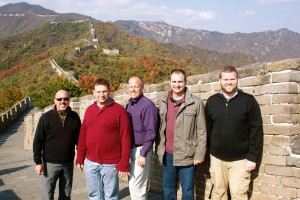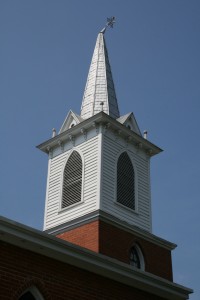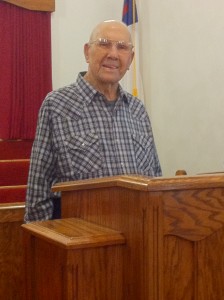By Byron Beck
This past October I had the opportunity to travel to China on a “vision tour” to observe the ministry of a group with which General Baptists have a partnership (it shall remain nameless for this article).
This organization helps people who want to teach English in Asia to find a university job in one of the great cities of China, or in one of a few other Asian countries. General Baptists have been partnering with them for a few years now-we provide teachers and they have the connections within the country.
I was truly impressed with the quality of people working for this organization and with the support structure they have developed to assist the teachers. Not only do they train and assist teachers for the cross-cultural challenges they will face, but they also provide an essential network for educational, emotional and spiritual care.
I traveled with a great group of men. There were four General Baptist leaders and one Freewill Baptist. We visited two cities: Beijing and Yinchuan. We toured a few Chinese landmarks such as the Great Wall and the Forbidden City. We worshiped in two churches on Sunday: one in Chinese and one in English (Several stories could be shared about these experiences). We also visited schools and met teachers and students. That, to me, was an exhilarating experience. I was very impressed with the students’ hunger to learn and their respect for their teachers, which is not so common in America.
I was most impressed with the Chinese Christians that I met. There are several stories that I could share, but I would like to mention one young PhD student that we met. His English name was Charlie and he was studying Mechanical Engineering. He told a fascinating story about his conversion that  included a dream/vision. His encounter with Christ was real and undeniable, but he spoke honestly about how hard the decision was for him.
included a dream/vision. His encounter with Christ was real and undeniable, but he spoke honestly about how hard the decision was for him.
In fact, being the analytical guy that he was, he drew out for our group a diagram of the “barriers to faith” that he and others must address in their journey toward Christ.
Here are the six barriers:
- Party Membership – Everyone is encouraged to join, and it is, of course, officially atheistic
- Education System – They are taught Marxist doctrine and other belief systems that are not sympathetic to Christianity
- Alternate Faiths – They are told Christianity is not Chinese; if you are going to be religious, pick something like Buddhism
- Family/Peer Pressures – This cannot be over-emphasized; it is disgraceful to betray one’s family. Theirs is not a “rebellion” culture and harmony is greatly valued
- “Normal” Temptations – sexual, materialism, etc
- The Battle of the Will – Will I surrender to God’s Kingdom? Will I give up my rights for the sake of Christ?
Honestly, I could not have been more impressed with this young man’s insight and his ability to graphically demonstrate the struggle. I was also impressed with his earnest desire to follow Jesus in spite of the obstacles.
I suppose there is a diagram like this that relates to every culture in the world.
There is a great opportunity in China. The Chinese educational officials have told this organization that they would like 300 new teachers over the next five years. That sounds like a “Macedonian Call” to me. What do you think?
Byron Beck has served General Baptist churches in Illinois, Kentucky and Missouri, and has pastored Fellowship General Baptist Church in Poplar Bluff, MO for 27 years. He is married to Kathy Beck, and they have a daughter, Katie. He will be sharing more about his trip and the different opportunities for you to invest in Asian students overseas at the Summit next week. His workshop will take place Tuesday, July 22nd, at 1:30 pm in Plaza A. This is your opportunity to make a major impact on students in Asia, either for a few weeks or a few years.



